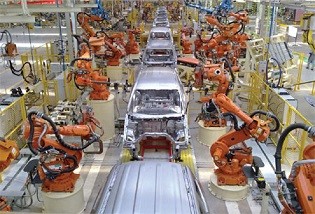Robots are increasingly replacing humans in China’s manufacturing industry due to the rapid growth in the robotics sector, after the government launched its "China Manufacturing 2025" strategy in March, the Global Times reported.
Following the launch, several provinces have also announced plans for the greater use of robots in industries like automobile manufacturing, textiles and electronics, the report said.
According to observers, the use of robots will help address the country's problem in labor shortage and create more high-skilled jobs to employ new college graduates.
The report said that the rise of China's robot companies was the result of the huge demand for robots.
China National Radio has reported that China now has over 500 robot companies, accounting for half of such companies worldwide. Most of the robot companies were established in the past four years.
Reuters reported that two years ago, China was the world's biggest buyer of robots.
Sun Ying, deputy president of the Zhejiang Robot Association and head of a robot company in Hangzhou, told the Global Times that robots will only be used to replace workers doing repetitive and low-skill work or those working in harsh environments, and also to complete high-accuracy tasks.
"Robots will not completely replace humans, as various industries still require high-skilled workers," Sun said.
According to Sun, the company's sales grew by 50 percent in only one year after the company was established in 2012, and have continued to soar.
"China needs to rely on basic industries to catch up with developed countries, the core of which is manufacturing, and intelligent manufacturing is the core of manufacturing," Sun added.
Experts predicted that the value of China's robot market will increase by 50 percent in coming years, reaching over 100 billion yuan ($15 billion) by 2020, as robot manufacturing received government support.
The report said that the Guangdong government will invest 943 billion yuan to replace human laborers with robots in the next three years, as it plans to set up two advanced industrial bases for robot production by the end of 2017.
The manufacturing city of Kunshan, in Jiangsu Province, has also announced on Monday, Sept. 21, that it will invest 2 billion yuan every year to encourage robot production, the China News Service reported.
Du Yang, a research fellow with the Institute of Population and Labor Economic at Chinese Academy of Social Sciences, told the Global Times that the dwindling workforce and increasing labor costs have led to the introduction of "pro-robot" policies.
"The demand for robots in manufacturing is a market behavior, and there is no need to worry that the employment rate might drop," Du said.
Both Du and Sun expressed confidence that the introduction of robots will significantly ease labor shortages in South China.
"It could also improve the grim employment situation for college graduates, as the robot industry will create more high-skilled jobs," Du said.



























